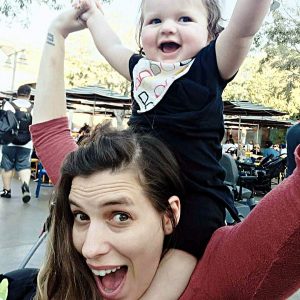Rebecca Sumner —
I’m eking this out down to the wire. I thought I’d write this lilting article way in advance. It would be well researched. It would be poetic. Original. Challenging. Honest. It will be honest. It may not be any of those other things. It certainly will not be early.
And I used to be all those other things. I used to write often and well. I used to dream of writing a book. As a pastor, my liturgies and sermons used to be meticulous, seamless, beautiful, extravagant, every movement dripping with meaning. And for the last year, I just haven’t. My last real blog post was almost a year ago.
Something happened a year ago. Something amazing. The best thing that ever happened to me. And when it happened, I also lost some of my favorite pieces of me. I lost a lot. I’m told by others who have had similar costly miracles that it will come back in time. A good friend told me not to expect to be myself again for three years. But then, I’ll come back.
 So, what happened a year ago? A year ago – to the day – I was ushering my daughter into the world. She didn’t make it in time for International Women’s Day. She took another three hours to get here. But I spent International Women’s Day doing the hardest – most costly and most wonderful – work I’ve done in my life. And three hours later I met the most wonderful person in the world. (I’m biased, I realize, but you might agree if you met her.)
So, what happened a year ago? A year ago – to the day – I was ushering my daughter into the world. She didn’t make it in time for International Women’s Day. She took another three hours to get here. But I spent International Women’s Day doing the hardest – most costly and most wonderful – work I’ve done in my life. And three hours later I met the most wonderful person in the world. (I’m biased, I realize, but you might agree if you met her.)
Recently, Christine Sine wrote something about Lent and birth: “We give up so that something new can be birthed.” She invited us to consider the things that we would like to see birthed in and through us in this season leading up to Easter. The focus was definitely on the birthing. But as I read her words, I couldn’t help but also sit with the giving up. With all the love in my heart for the person I birthed, I couldn’t help but sit with the giving up, and weep.
When things are born, the world changes. It will never be the same. When we give birth to something, we change. If it is something as miraculous as my daughter – or as a fruitful ministry, or as a new understanding of what love and justice might look like in our world – if it is something miraculous, it makes big changes. It brings newness and life, but it also demands something of us.
My friend told me that, in three years, I’ll feel like myself again. I believe her. I also don’t believe her. I am forever changed. And in a season full of paradoxes, within a faith tradition full of paradoxes – where death is slain through death and new heights of aliveness comes from the end of a life – there is joy and there is grief in being forever changed.
My daughter is the among greatest things that have happened to me. Easter is among the greatest things that have happened to the world. As many of us are awakening to our privilege, the need for greater love and justice, the hard work to do on the road to love and justice, I truly believe this difficult road we are all on will turn out to be one of the greatest things that happened to us collectively. If even an ounce of justice is born through us this Lenten season, if even an instant of love is cradled in our arms by Easter, if even one soul finds some sort of liberation, the birth is well worth the giving up. And yet, there is grief in the giving up.
Today on International Women’s Day, I want to invite us to let ourselves grieve. What have the various metaphorical or literal births in our lives cost us? What have others given up to birth newness in and through you? What did God give up to birth a whole new abundant kind of life for all of us?
On this International Women’s Day, I am struck by the absolute beauty and pain – privilege and cost – of living as a woman in this world, where so much needs to be birthed and so much must be given up. I am struck by the goodness and costliness of being a person in this world and this faith tradition, where God gives of God’s self and we in turn give of ourselves to bring crescendoing newness, life, and goodness into the world. But the birth always comes with a giving up. And the giving up always comes to birthing.
I’d say “Al—uia,” but we save those for Easter, for the first breath of the new birth. But I will say “Amen.”
Rebecca Joy Sumner is a christian, pastor, liturgist, abolitionist, wife, neighbor, church planter, writer (ish), theologian (ish), artist (ish), and basically just someone who playfully clings to this radical thing called hope — specifically, hope that God’s commonwealth of love and justice to come more and more with every new day. She is lead pastor as Our Common Table in Everett, WA.
